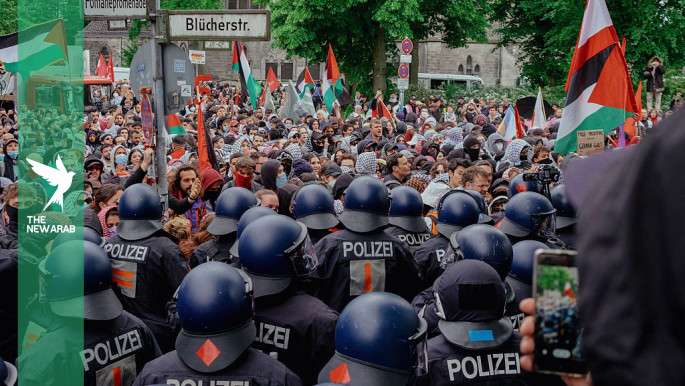Germany’s insult law was profoundly shaped by the Nazi era. What had once been a tool to protect aristocrats and military elites was “democratised” under the Third Reich to safeguard the supposed honour of all Aryans, writes Hebh Jamal. [GETTY]
In Germany, a patronising legal system presumes it alone can cast moral judgment, police language, and punish non-violent political speech under the guise of protection. What is presented as safeguarding democracy has instead become its undoing: a machinery of repression that dictates which truths may be spoken, and which must be silenced.
Nowhere is this clearer than in the treatment of pro-Palestinian voices. Fines, felony charges, and arrests are not handed down for acts of violence, but for words rooted in the belief in Palestinian liberation.
Just two weeks ago, I sat in a German courtroom as my friend Yannik, a pro-Palestinian German, stood trial for “insult” after calling a known Zionist provocateur a “genocide supporter.” For four hours, I listened as his lawyer argued that major international organisations have categorised Israel’s actions as genocide, and explained that a judgment on someone’s politics is not an insult but a statement supported by international law.
During cross-examination, Yannik’s lawyer asked a simple question: “Do you support weapons deliveries to Israel?” The accuser replied without hesitation: “Yes.” And yet, Yannik was found guilty on two counts of insult and fined €3,600. To call this outcome absurd would be an understatement.
Nazi legacy
In Germany, Beleidigung law, §185 StGB, states: “the penalty for insult is imprisonment for a term not exceeding one year or a fine and, if the insult is committed publicly, in a meeting, by disseminating content or by means of an assault, imprisonment for a term not exceeding two years or a fine.”
As Jason Obermann has observed in The Left Berlin, drawing on the work of legal scholar James Q. Whitman, Germany’s insult law was profoundly shaped by the Nazi era. What had once been a tool to protect aristocrats and military elites was “democratised” under the Third Reich to safeguard the supposed honour of all Aryans, what Whitman calls “the privilege of arrogance.”
The Nazis even introduced the idea of “group insult,” prosecuting people for insulting entire organisations such as the SA or SS. At its core, Obermann notes, the law was less about protecting dignity than about compelling the less powerful to defer to the powerful, an authoritarian legacy that still echoes in Germany’s courts today.
Insult and slander, when directed at Palestinians, however, remain perfectly legal. German media, politicians, and individuals have repeatedly called me a “Jew hater,” “terrorist sympathiser,” “antisemite.” Their rights? Protected. I was advised multiple times by legal experts that I would lose if I took any of these people to court. Insult law in Germany is not meant to protect the vulnerable, but to uphold the hegemonic politics of the state and shield its actors from accountability.
Weaponising antisemitism
Take the case of Mahmud, a German-Palestinian activist arrested at a demonstration in Frankfurt before thousands of people. I witnessed police strip the microphone, punch a protester in their way, and drag him from the stage. His “crime” was reciting a poem that drew parallels between the crimes of Nazi Germany and the genocide in Gaza. In his words:
History has clearly repeated itself
Instead of the Jews, Palestinians are now under threat
The same thing does not have to happen in exactly the same way
To say what everyone can see with their own eyes
It was Holocaust then and it is Holocaust today
No matter who denies it, people will have known it later
But it will be too late—where was your intervention?
Genocide is happening again and it is dividing humanity.
For these lines, Mahmud was banned from the demonstration and arrested. Authorities accused him of “Holocaust relativisation,” while the media seized on the charge to brand the entire protest as antisemitic.
The so-called crime of Holocaust relativisation falls under hate-speech law, criminalising the approval, denial, or trivialisation of the Holocaust “in a manner that is capable of disturbing public peace.” But what about comparisons meant to evoke empathy?
German memory culture considers the Holocaust a one-of-a-kind atrocity, beyond comparison, beyond historical continuity. Because unconditional support for Israel is central to the country’s Politik, drawing comparisons between the Holocaust and Gaza is treated as especially egregious.
Both former Chancellor Olaf Scholz and current Chancellor Friedrich Merz have publicly denied that a genocide is taking place in Gaza. By this logic, calling it one, or comparing it to the Holocaust, becomes a crime. Of course, this restriction does not extend to Germans relativising the Holocaust in other ways, by claiming “Free Palestine is the new Heil Hitler” or by equating Palestinians themselves with Nazis.
These are not isolated cases, however.
Double standards
Court Watch Berlin has documented over 10,000 investigations in the city alone, clustered around protest arrests, chants, and social media posts. A common charge, often accompanied by police violence, is the chant: “From the river to the sea, Palestine will be free,” which German authorities falsely claim is a Hamas slogan. By contrast, openly violent Zionist or racist incitement often goes unpunished.
Court Watch observed in over 200 cases a consistent double standard: judges and prosecutors routinely rely on police as “neutral” witnesses, even when those same officers were the ones enacting violence against protesters.
I witnessed this first-hand. In one case, a Palestinian activist was accused of resisting arrest and assaulting an officer. When brought in to testify, the officer admitted he remembered nothing: not her face, not what she allegedly did. When the judge asked if her actions could have been self-defence, he answered, “Maybe. I can’t remember.”
And still she was found guilty.
All of this is intentional. The German state uses its courts and its so-called “hate speech” and “insult” laws to throw the pro-Palestinian movement into a bureaucratic nightmare. Activists are forced to spend their time, resources, and money defending themselves before judges who parrot the political language of genocide-complicit politicians.
Germany must stop being treated as a democratic safe haven. The repression of pro-Palestinian voices is not a deviation from its legal system but its very function. Laws on insult, hate speech, and Holocaust relativisation are wielded not to protect vulnerable communities but to police dissent and enforce state ideology.
This is why activists are dragged through endless trials, fined thousands of euros, and branded criminals for words, while the German government ships weapons to Israel. It is why courts elevate “Israel’s right to exist” above the right to free expression, and more importantly valued more than the right for Palestinians to not be massacred. And it is why, in Germany today, words of solidarity with Palestinians are punished more harshly than the violence those words seek to end.
In Germany, words are treated as more violent than shattered limbs.
Hebh Jamal is a Palestinian American journalist based in Germany.
Follow Hebh on X and Instagram: @hebh_jamal
Have questions or comments? Email us at: editorial-english@newarab.com
Opinions expressed in this article remain those of the author and do not necessarily represent those of The New Arab, its editorial board or staff.

